人教版高一英语必修四Unit 3reading + language points课件(共81张PPT)
文档属性
| 名称 | 人教版高一英语必修四Unit 3reading + language points课件(共81张PPT) | 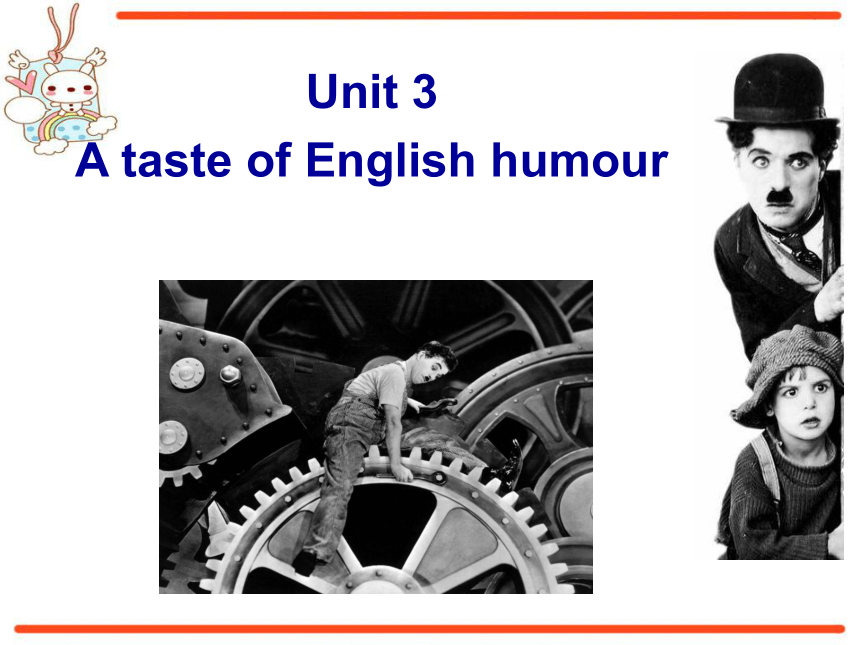 | |
| 格式 | zip | ||
| 文件大小 | 4.7MB | ||
| 资源类型 | 教案 | ||
| 版本资源 | 人教版(新课程标准) | ||
| 科目 | 英语 | ||
| 更新时间 | 2020-03-21 15:05:46 | ||
图片预览

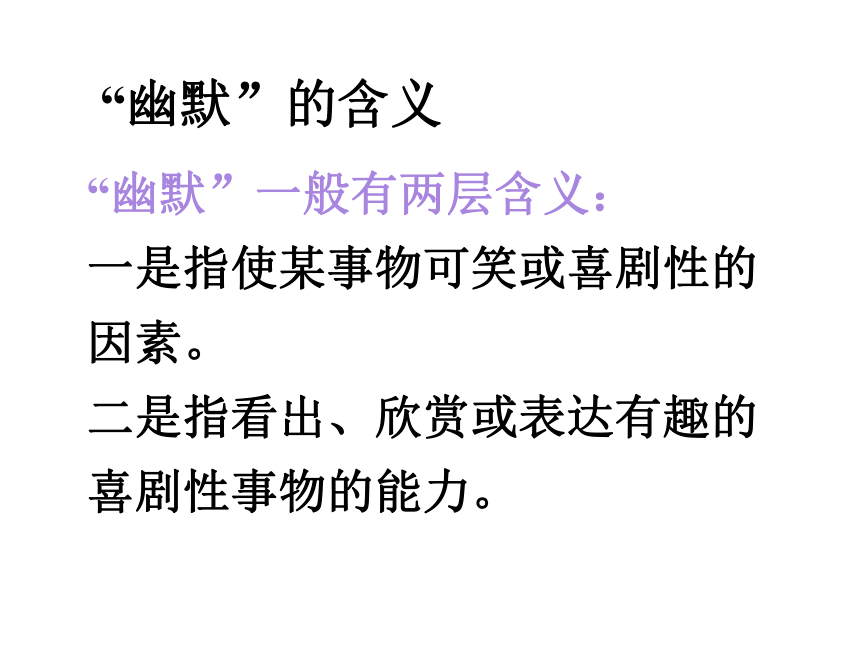
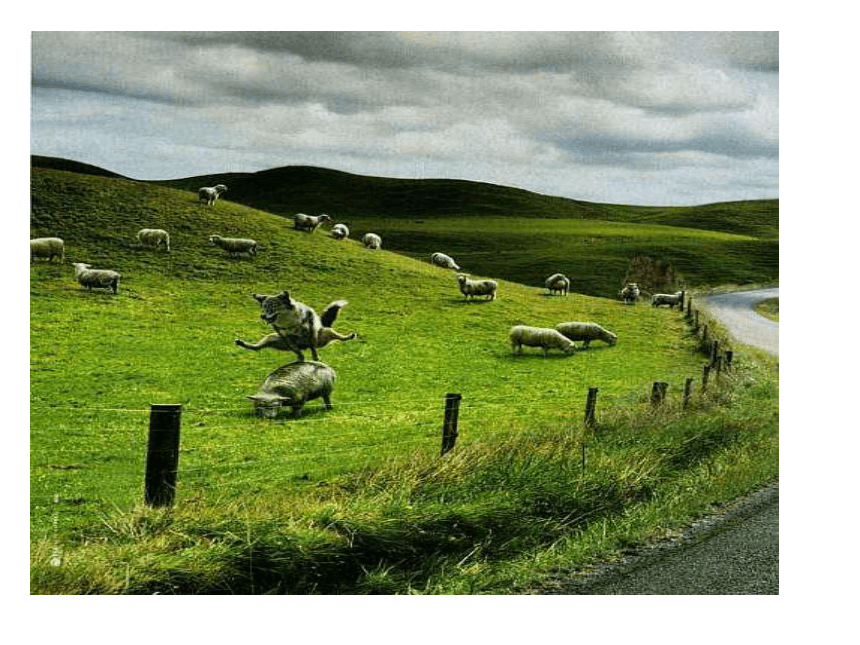
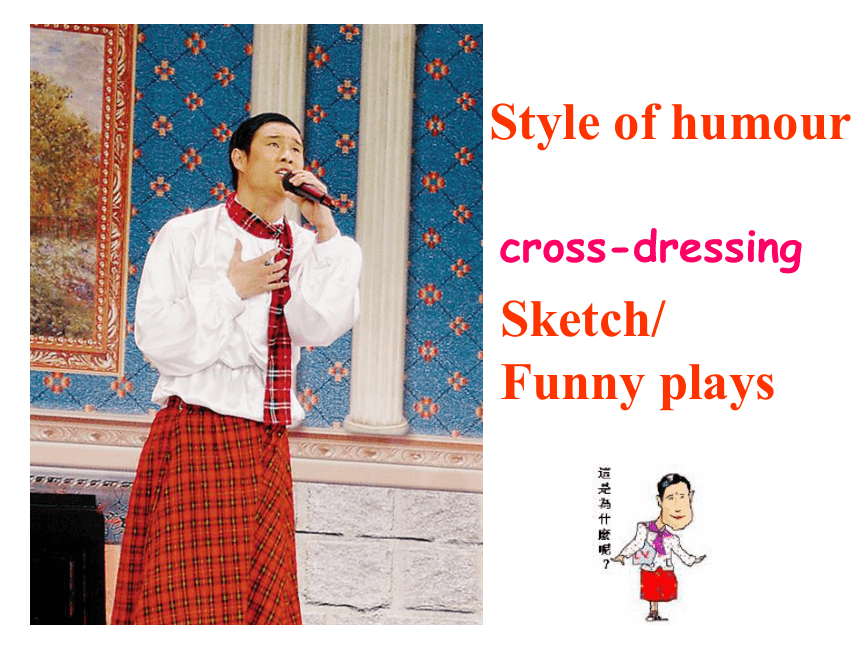
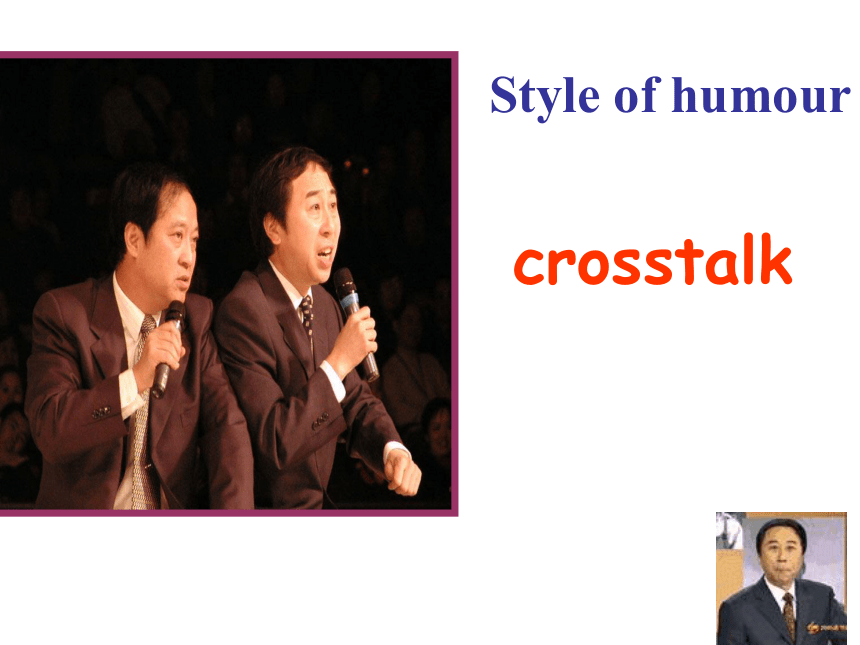
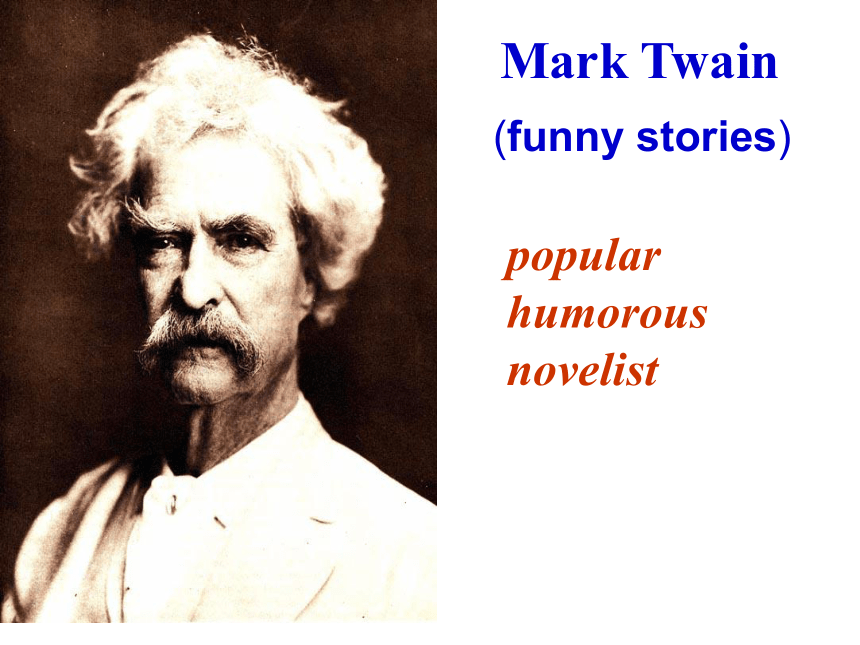
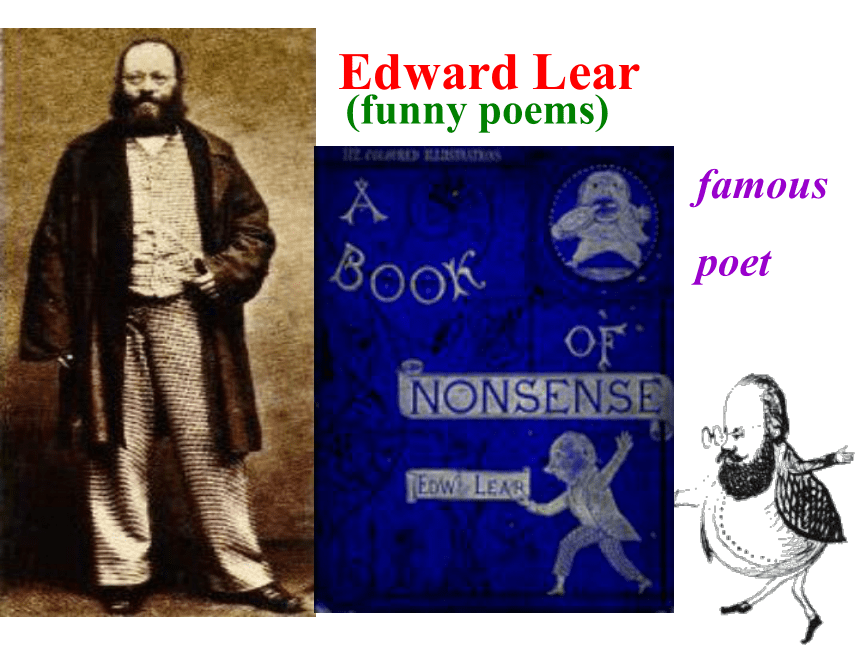
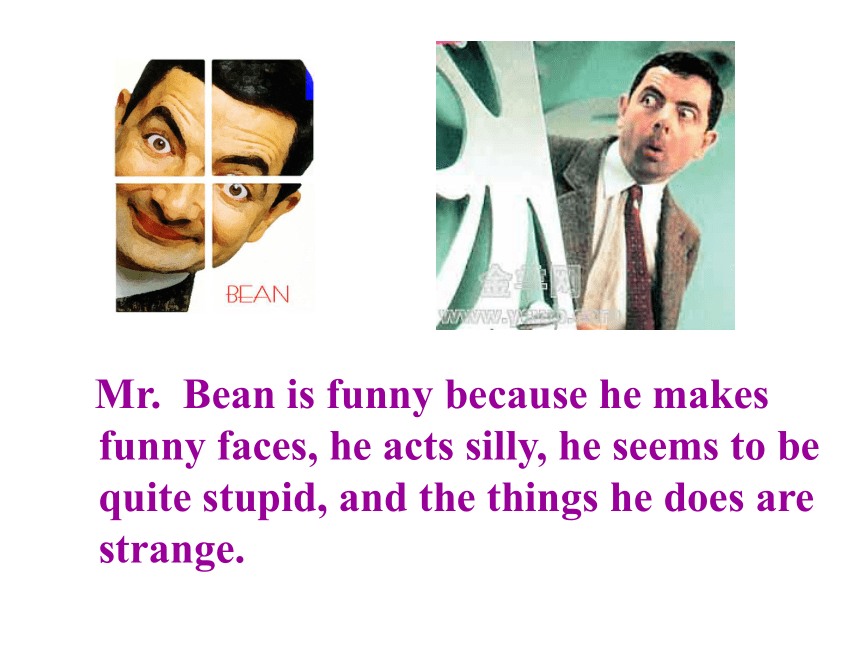
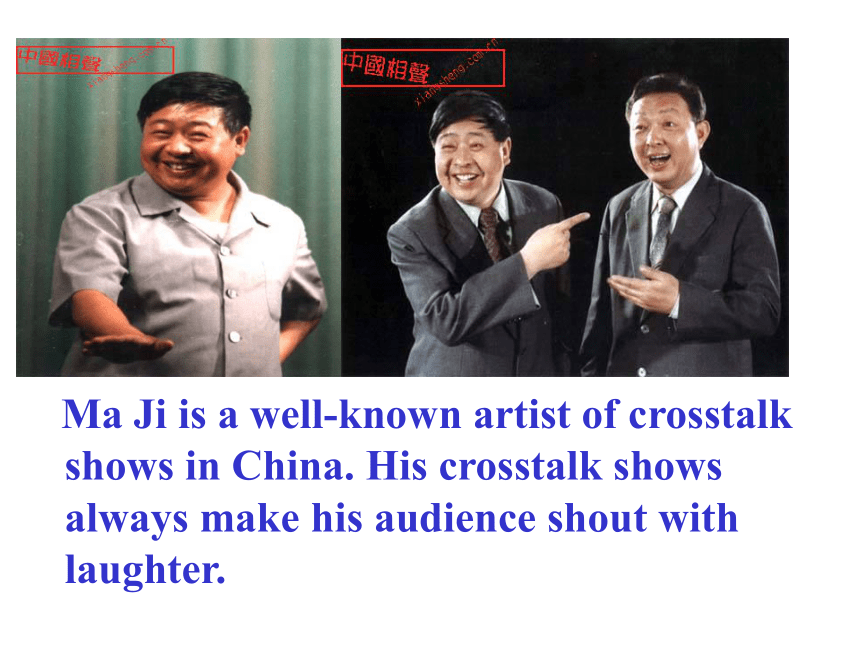
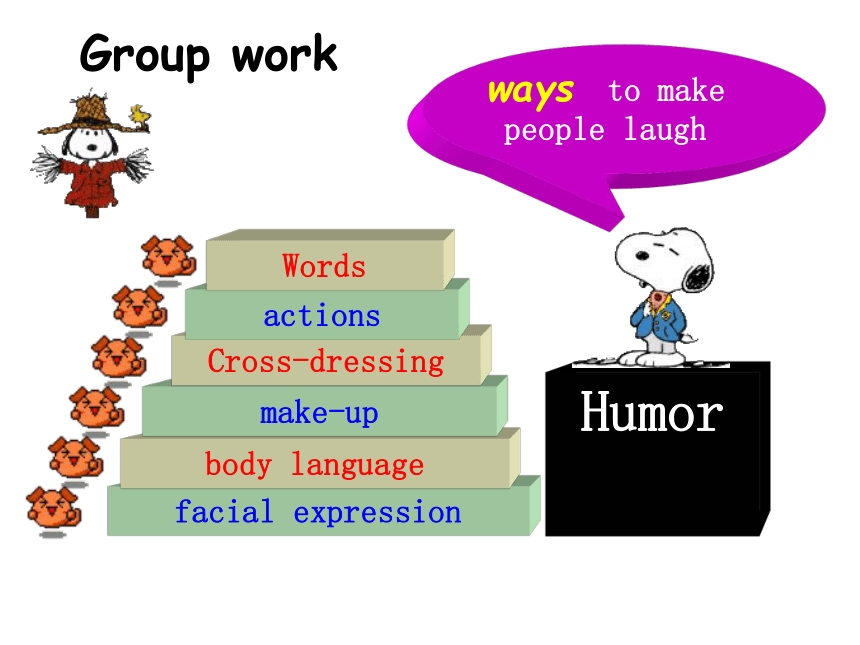
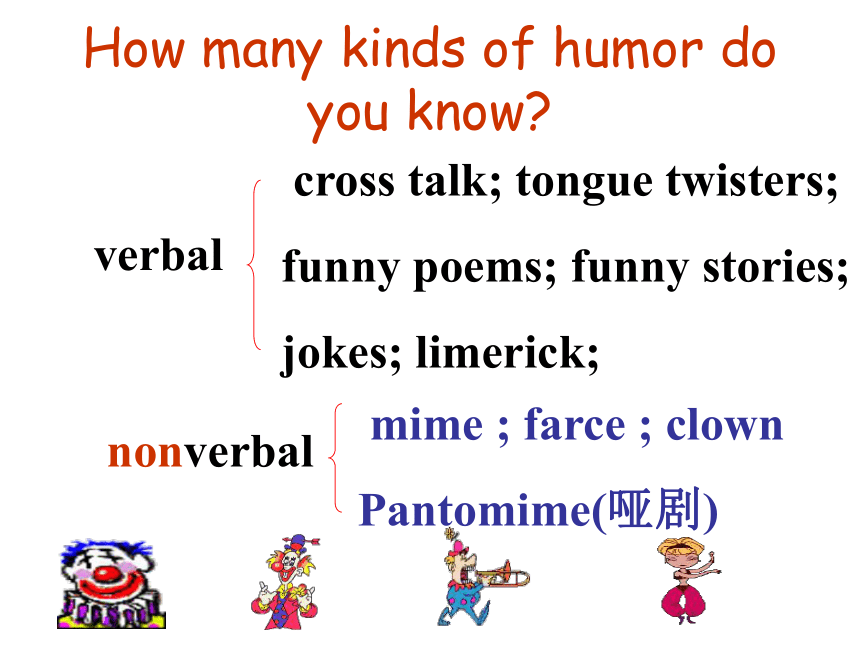
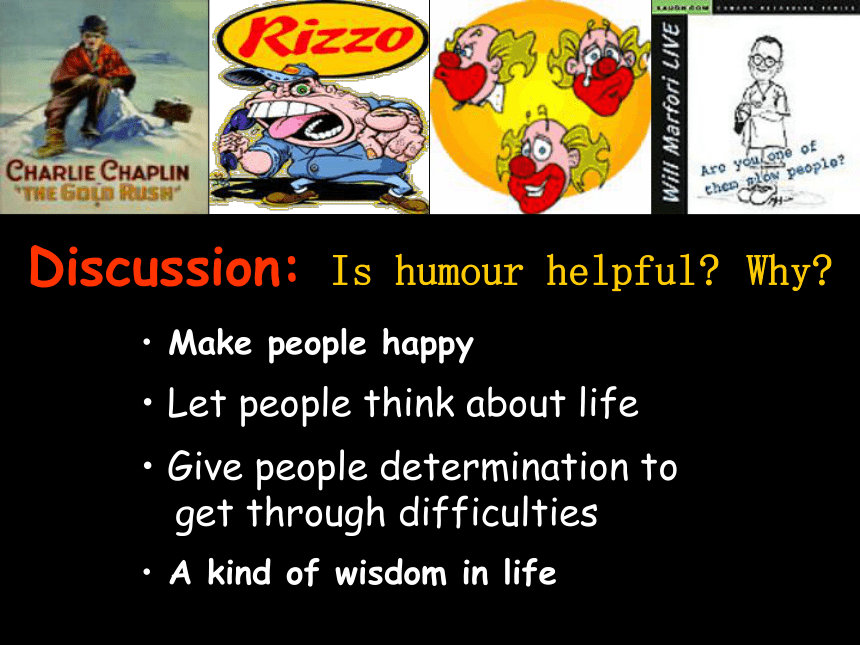
文档简介
(共93张PPT)
Unit 3
A taste of English humour
“幽默”的含义
“幽默”一般有两层含义:
一是指使某事物可笑或喜剧性的因素。
二是指看出、欣赏或表达有趣的喜剧性事物的能力。
Style of humour
Sketch/
Funny plays
cross-dressing
Style of humour
crosstalk
Mark Twain
(funny stories)
popular
humorous
novelist
Edward Lear
(funny poems)
famous
poet
Mr. Bean is funny because he makes funny faces, he acts silly, he seems to be quite stupid, and the things he does are strange.
Ma Ji is a well-known artist of crosstalk shows in China. His crosstalk shows always make his audience shout with laughter.
facial expression
body language
make-up
Cross-dressing
actions
Humor
ways to make people laugh
Words
Group work
How many kinds of humor do you know?
verbal
nonverbal
cross talk; tongue twisters;
funny poems; funny stories;
jokes; limerick;
mime ; farce ; clown
Pantomime(哑剧)
Discussion: Is humour helpful? Why?
Make people happy
Let people think about life
Give people determination to
get through difficulties
A kind of wisdom in life
Unit 3
Reading:A Master of Nonverbal Humor
Charlie Chaplin —
The Gold Rush
Charlie Chaplin
Charlie Chaplin—The Gold Rush
The Gold Rush
1. What do you know about Charlie
Chaplin?
2. What do you know about his film?
What is so interesting about them?
Pre-reading
a small
black hat
a moustache
a stick
very wide
trousers
Little Tramp
The Little
Tramp was
a _____ and
___________
person.
poor
homeless
The whole text introduces a world-
famous actor---Charlie Chaplie and
his excellent performances, making us
understand more about nonverbal
humour.
3. Look at the title and write down
your idea in one sentence. Then skim
the passage and see if you were right.
A MASTER OF NONVERBAL HUMOUR
Reading
The main idea of each paragraph
Paragraph 1:
Paragraph 2:
Paragraph 3:
Why people needed cheering up
What Charlie’s childhood was like
What his most famous character was like
Paragraph 4:
Paragraph 5:
An example of a sad situation that he made funny
His achievements
Para 2: Finish the chart.
died
worse off
sing
dance
actors
humour
Childhood What happened Things
Family His father _____,
leaving the
family even
___________. His parents taught him
______ as soon as he could
speak and _______ as soon
as he could walk.
Teens Charlie became one of the
most popular child ______
in England through his
________.
Complete the notes about Charlie Chaplin.
1889
actor
mime
little tramp, a poor and
homeless person
large trousers, worn-out
shoes, small round black
hat and a walking stick
Born
Job
Type of acting
Character
Costume
charming, social failure with a determination to overcome difficulties and always kind
1977
Reason for success
Died
Para 4: Put the events in the right order.
( )Chaplin tried cutting and eating the bottom of
the shoe.
( )Chaplin and his friend washed sand and expected
to pick up gold, but they failed.
( )They were so hungry that they boiled a pair of
leather shoes.
( )They were caught in a small wooden house.
( )Chaplin cut off the leather top of the shoe.
( )Chaplin picked out the laces and ate.
6
1
3
2
5
4
Charlie Chaplin
Para.1
Retell the text according to the chart.
1. Charlie Chaplin was poor when he
was a small boy.
2. People who don’t know English
cannot enjoy Chaplin’s films.
3. The Gold Rush is set in California
in the late of the nineteenth century.
T
F
F
True or false?
4. In The Gold Rush Chaplin and his
friend are fortunate to find some gold .
5. In the film the meal he eats is hard to
chew.
6. Chaplin not only acted in films but
wrote and directed films as well.
F
T
T
How do you understand the sentence
“Laughter is the sun that drives winter from
the human face.”?
A. Laughter is the power to drive winter
away and welcome warm spring.
B. Laughter can keep one’s face warm,
especially during freezing winter.
C. Laughter can make people forget their
problems and make them feel happy.
C
Choose the best answer.
2. The Gold Rush, one of Chaplin’s most famous
films, was made in ____.
A. America B. Britain
C. Canada D. Australia
3. The story of The Gold Rush happened ____.
A. in the 1750s B. in the 1850s
C. in the 1890s D. in the 1950s
A
B
4. In The Gold Rush, Chaplin and his
friend eat a pair of shoes because ___.
A. they are interested in it
B. the shoes are delicious
C. they want to make the people
laugh
D. they are very hungry
D
5. Which is NOT true?
A. Charlie was a master of non-verbal
humor.
B. Charlie showed humanity and
kindness in his movies.
C. Charlie was a social failure, so he
could play that character well.
D. Charlie must have experienced sad
situations when he was a child.
C
6. People enjoy seeing other people’s bad
luck because _________.
they enjoy doing so.
it makes people more worried about
their life.
C. it makes people more content with
their life.
D. there’s much fun in doing so.
C
7. The Little Tramp is well known because ____.
Chaplin played a poor and homeless person.
B. The character was social failure.
C. Chaplin wore large trousers, worn-out
shoes and a small round black hat and
carried a walking stick.
D. Chaplin play a role as a man who determined
to overcome difficulties and was kind even
when people were unkind to him.
D
8. Chaplin was given a special Oscar for
________.
the characters he played in his films.
the films he directed.
the joy he gave us in his films.
the contributions he made in films.
C
9. What’s the main idea of the text?
A. The history of English humour.
B. The films that Chaplin made.
C. The humour Chaplin made in his films.
D. The Gold Rush in California.
C
The writer mentioned that Charplin’s character
“little tramp” is charming and lovable, and he
won an Oscar for a lifetime of outstanding work,
which proves that the writer likes Charplin and
appreciates his work.
10. What’s the author’s attitude to Charlie
Charplin?
A. positive B. negative
C. serious D. appreciative
D
Discussion
1. What’s behind fun?
Not all humour is kind. Although we also laugh when we see someone slide on a banana skin, it’s really dangerous to those who slide on the banana skin, especially to those old people. So when we think about it we will find it’s not funny.
2. Why did people like The Little Tramp?
Because it gives people courage to
overcome difficulties.
3. Do you think Chaplin’s eating boiled
shoes funny? Why?
Yes. Because he made the terrible situation
“real” for his audience. And he was able
to show the humanity and kindness in
the most difficult circumstances.
4. Why could Charlie Chaplin make terrible
situations (like poverty and starvation) funny?
Because he had experienced the bad situation
and made them “real” for his audience.
5. Why did he get a special Oscar?
Because of his outstanding work in films and
life long contribution.
Fill in the blanks.
Do you find it funny to see someone ______ on a
Banana ____, ________ into someone else round a
_______, or ______ down a hole in the road? If you do,
you are not _____. Some humour can be_____. Perhaps
it makes us feel more ______ with our life because we
feel there is someone else ______ ____than ourselves.
Charlie Chaplin was born in _______ in 1889 and at
that time films were ______. He became famous for
using a _________ form of acting, including _______
and ______.
sliding
skin
bumping
corner
falling
alone
cruel
content
worse
off
poverty
silent
particular
mime
farce
We should be optimistic(乐观) no matter what
difficulties you meet with, just as Charlie
Chaplin was.
Set up an aim
Do our best
Pay more time then others
Never give up/ lose heart
Insist on what we pursue
... and up to now nobody has been able to
do this better than Charlie Chaplin.
句中up to now = up till now, 表示“到现在
为止”, 常与现在完成时连用。如:
I haven’t got any letters from him up to now.
直到现在我还没收到过他的信。
Her life has run smoothly up to now.
她的生活到目前仍一帆风顺。
【拓展】
up to 达到……程度或数量
be up to sth 能胜任某事; 忙于某事或
从事于某事
be up to sb 该由某人做出决定; 取决于某人
… so they could feel more content with
their lives.
1) content adj. 满足; 满意; 知足
常见搭配: be content with sth.
be content to do sth. 如:
Are you content with your present salary?
你对你现在的工资待遇满意吗?
She is quite content to stay at home looking
after her children.
她呆在家里照顾孩子感到非常知足。
区别: content; contented; satisfied
content与contented意思接近, 指“虽然各种愿望
没有实现, 但人安于现状不再多求”,
content 一般作表语, 而contented一般作定语;
satisfied指“愿望、渴望或需求都得到了满足,
因而心满意足了”。
She has a contented look. 她显得满意的样子。
2) content n. 所含之物, 内容 如:
I like the style of the book but I don’t like
the content.
我喜欢这本书的文体, 但我不喜欢它的内容。
We sat there, ______with what we listened to.
satisfying B. to satisfy
C. contented D. content
解析: 本题考查动词用法。
satisfied表示“感到满意的”, 把A、B两项
排除; content既是形容词, 又是动词,
be content with对……满足。
D
3) content vt. 使满足 (+with)
e.g. Her answer seemed to content him. 她的回答好像令他满意。
3. Not that Charlie’s own life was easy!
卓别林自己的生活并没有那么容易!
本句为not构成的倒装句。that为副词, 修饰
形容词easy。
在英语中, 有时为了强调某一成分而将具有
否定意义的副词置于句首构成倒装句, 这样
的副词有not, never, seldom, little, few等。
本句可转换为:
Charlie’s own life was not that easy!
又如:
Only in the country can you learn the
“true English”. Never have I seen such a performance.
Nowhere will you find the answer to this
question.
Not until the child fell asleep did the
mother leave the room.
4. You may find it astonishing that Charlie
was taught to sing as soon as he could speak
and dance as soon as he could walk.
令人感到震惊的是, 当查理会说话和走路的
时候就被教唱歌和跳舞。
1) it在句中作形式宾语, 动词不定式to see…the
road才是真正的宾语。当动词不定式作句子
的宾语, 同时有一个形容词同宾语在一起时,
常用it作形式宾语。如: I’ll make it my business to help her.???
我会把帮助她作为我的责任。 Do you consider it wise to tell them about it?
2) astonish: v. 使(某人)吃惊, 震惊, 比surprise的
语气要强。如:
The earthquake astonished me.
地震使我惊慌失措。
be astonished 吃惊 如:
She was astonished to find he was drunk.
发现他喝醉了, 她很吃惊。
I was astonished at/by the news.
这消息使我大吃一惊。
to one’s astonishment 令…惊异的是…
To our astonishment the small boy swam
across the river. 令我们惊奇的是那小男孩居然游过了那条河。
astonishing adj. 令人吃惊的
an astonishing remark 惊人之语
astonishment n. 惊异; 惊愕; 惊奇
in astonishment 愕然, 吃惊地 如:
She stared at me in astonishment.
她吃惊地瞪着我。
5. fortunate为形容词, 意为“幸运的; 运气
好的”, 相当于lucky, 其反义词为unfortunate。
常用结构: be fortunate (enough) to do 或
be fortunate in doing 意为“……很幸运”。 如:
She is fortunate (enough) to have a rich husband.
=She is fortunate in having a rich husband.
她很幸运,有一位富有的丈夫。
此外, 还可用于It is fortunate that …这一结构,
意为“……真是幸运”。如:
It is fortunate that we got there in time.
很幸运的, 我们及时赶到那里。
fortunately adv. 用来修饰整句话, 意为“幸运
地, 幸亏”, 反义词为unfortunately。 如:
Fortunately, I found his house at once.
很幸运地, 我立刻找到了他家。
fortune n. “机会; 命运; 运气” 如:
She has had her fortune told. 她请人算了命。
复合词: fortune-teller n. 算命者
固定搭配: make a fortune 发大财
谚语: Fortune favors fool. 傻人有傻福。
6. Unfortunately his father died, leaving
the family even worse off …
worse off: adj. (情况)更糟糕的, 更贫困的
Mark has lost his job and is worse off
than ever.?
马克的工作丢了, 情况比以前更糟。
better off 情况更好
He will be better off in hospital.?
他住院留医的话, 病情定会好转。
I’ve only broken my arm; other patients are
far worse off than me.
我只是胳膊折了, 其他病人比我严重得多。
Tom has lost his job and is worse off than ever.
汤姆的工作丢了, 情况比以前更糟。
【拓展】
badly off 穷的; 缺少的
well off 富有的
7. No one was ever bored watching him —his
subtle acting made everything entertaining.
entertaining adj. 表示“使人快乐的; 有趣的”
He told us an entertaining story yesterday.
昨天他给我们讲了一个有趣的故事。
Films should be entertaining.
【拓展】entertain v. 使感兴趣; 使娱乐; 招待
entertainment n. 娱乐; 款待; 招待
entertainer n. (娱乐节目的)表演者
8. …because known throughout the world.
throughout prep. 1) (表示地区) 遍及, 整个 如:
The company has branches throughout
the country. 这家公司的分店遍及全国。
2)(表示时间) 整个, 从头到尾 如:
It rained throughout the day. 雨下了一整天。
He led a poor life throughout his life.
他一生过着穷苦的生活。
throughout adv. 1) 整个地, 在所有各处, 全部
e.g. The hill was green throughout.
那座山整个都是绿的。
2) 自始至终, 到最后 如:
She remained silent throughout.
她从头到尾都保持沉默。
9. The tramp, a poor, homeless man with a
moustache, wore large trousers, worn-out
shoes...
1) homeless adj. 无家可归的
-less是表示否定意义的形容词后缀, 加在某些
名词的后面构成否定意义的形容词, 类似的如:
helpless 无力的; 无计可施的;
无助的; 无依无靠的
careless 粗心的; 轻率的
childless 没有儿女的
harmless 无害的; 无损害的;没有恶意的; 无邪的
ceaseless 不断的; 不停的
countless 数不尽的; 无数的
tireless 不会疲倦的; 不知疲倦的, 不休止的
2) worn-out adj.
(衣类、机器等)磨破的; 磨损的; 用旧的 如:
worn-out shoes 穿旧的鞋
精疲力尽的; 憔悴的(一般不用在名词前) 如:
She looks worn-out.
她看起来憔悴不堪。
10. This character was a social failure but was
loved for his optimism and determination to
overcome all difficulties.
这个角色是社会生活中的失败者, 但他的乐观
精神和战胜困难的决心使他受到人们的喜爱。
本句为but连接的并列句, but后的分句承前
省略了主语this character; to overcome all
difficulties为动词不定式短语作定语, 修饰
determination。
本句可理解为: This character was not a
successful person in social life, but people
loved him because of his optimism and
determination to overcome all difficulties.
failure: n. 失败; 失败者
The play was a dead failure.? 这场戏完全失败了。
overcome v. (overcame, overcome) 战胜; 克服
There will be no difficulty in the world that
they cannot overcome.?
世界上任何困难他们都可以克服。
11. Charlie first picked out the laces and eats
them as if they are spaghetti.
pick out: 挑出; 辨别出
My father helped me pick out a new book.?
我父亲帮我选了一本新书。
与pick有关的短语:
pick off 摘取
pick oneself up (倒下的人)站起来
pick up 拾起, (车, 船)搭载客人, 驾车去接(人),
接收(信号, 广播、电视节目), 学会(语言)
pick up with 在偶然机会认识(人)
This picture was taken a long time ago. I wonder if you can ____ my father. (湖北2005)
A. find out B. pick out
C. look out D. speak out
B
find out (通过研究、努力)发现, 找出;
look out 向外看, 当心, 注意;
speak out 大声且清楚地说出。
只有pick out意思合适。
12. Then he cuts off the leather top of the shoe
as if it were the finest steak.
cut off: 切断; 断绝
A storm cut off power to the whole region.?
暴风雨切断了整个地区电力供应。
The television show was cut off by a special
news report.
电视节目被一条特别新闻报道打断了。
I had my hair cut off and sold it.
我把头发剪掉卖了。
We were completely cut off from the
outside world.
我们和外界完全隔绝了。
【拓展】
cut across 取捷径; 走近路
cut in 插嘴
cut down 减少; 缩减
cut up 切碎
cut out 切掉; 割掉
cut into pieces 切成碎片
I was just talking to Margaret when Jackson _______. (湖南2005)
A. cut in B. cut down
C. cut out D. cut up
A
cut down 意为“砍倒”;
cut out 意为“剪掉; 除去, 省略, 删去”;
cut up 意为“切碎”。
He was in hospital for six months. He felt as
if he was ______ from the outside world.
A. cut out B. cut off
C. cut up D. cut through
解析: cut out 意为“切下; 删除”;
cut off 意为“切断; 使(人、城镇)孤立”;
cut up 意为“切碎”;
cut through 意为“穿越”;
本句的意思是: 他住院六个月感到似乎与
外界隔绝了。
B
13. He eats each mouthful with great
enjoyment.? 他一口一口地嚼得津津有味。 He took a mouthful of the bitter medicine
and made a face.
他喝了一口苦药, 做了个鬼脸。 I felt so full that I couldn’t eat another
mouthful.? 我太饱了, 一口也吃不下了。 短语: at a mouthful 一大口
handful? 一撮, 一把 a handful of sand? 一把沙子 cupful? 一满杯? two cupfuls of milk? 两杯牛奶 spoonful? 一匙; 满匙
two spoonfuls of sugar? 两匙糖 houseful 满屋; 一屋子 armful (单臂或双臂)一抱之量? an armful of books? 一抱的书
14. The acting is so convincing that it makes
you believe that it is one of the best meals he
has ever tasted!
convincing 用作形容词, 在这里表示
“使人信服的; 令人心悦诚服的”。如:
His analyses were always so convincing.
他的分析总是那么令人信服。
This is the most convincing evidence that I can
find to prove my point.
这是我所能找到的最令人信服的证据, 以证明
我的观点。
【拓展】
convince vt. 使相信; 说服; 使承认
convinced adj.
坚信不移的; 有坚定信仰的
convince ... of … 使……确信……
be convinced of 确信; 承认
15. Chaplin produced, directed, and wrote the
movies he starred in.
卓别林自制、自导、自编一些他自演的电影。
1) direct 在句中意为“导演”, 它还有其它意思:
adj. 直的; 直线的; 直达的 如:
There is no direct train from here to Taichung.
此地没有直达台中的火车。
a direct road to London 直通伦敦的路
fly in a direct line 直线飞行
adj. 坦白的; 率直的。 如:
He has a direct way of speaking.
他说话坦白。
He gave me a direct answer.
他给我率直的回答。
2) star v. (在电影中)主演, 由……主演;
以……为主角 如:
The director wants to star Jim in his new film.
这位导演想让吉姆主演他的新片。
She has starred in a lot of good films.
她主演了许多好电影。
The boy burst into tears ______ he saw his
mother.
direct B. direction
C. directly D. directly when
解析: 本题考查direct的用法, 作动词时表示
“导演; 指示”; 作副词时表示“径直地; 直接地”,
作形容词时是“直接的”; 而directly表示
“一……就”, 相当于as soon as.
A
“To truly laugh, you must be
able to take your pain, and
play with it!”
--Charlie Chaplin
Homework
Finish Exe. 1. & 2. on Page 20, all
exercises on Page 21.
2. Try to write a happy ending for the
film The Gold Rush.
Unit 3
A taste of English humour
“幽默”的含义
“幽默”一般有两层含义:
一是指使某事物可笑或喜剧性的因素。
二是指看出、欣赏或表达有趣的喜剧性事物的能力。
Style of humour
Sketch/
Funny plays
cross-dressing
Style of humour
crosstalk
Mark Twain
(funny stories)
popular
humorous
novelist
Edward Lear
(funny poems)
famous
poet
Mr. Bean is funny because he makes funny faces, he acts silly, he seems to be quite stupid, and the things he does are strange.
Ma Ji is a well-known artist of crosstalk shows in China. His crosstalk shows always make his audience shout with laughter.
facial expression
body language
make-up
Cross-dressing
actions
Humor
ways to make people laugh
Words
Group work
How many kinds of humor do you know?
verbal
nonverbal
cross talk; tongue twisters;
funny poems; funny stories;
jokes; limerick;
mime ; farce ; clown
Pantomime(哑剧)
Discussion: Is humour helpful? Why?
Make people happy
Let people think about life
Give people determination to
get through difficulties
A kind of wisdom in life
Unit 3
Reading:A Master of Nonverbal Humor
Charlie Chaplin —
The Gold Rush
Charlie Chaplin
Charlie Chaplin—The Gold Rush
The Gold Rush
1. What do you know about Charlie
Chaplin?
2. What do you know about his film?
What is so interesting about them?
Pre-reading
a small
black hat
a moustache
a stick
very wide
trousers
Little Tramp
The Little
Tramp was
a _____ and
___________
person.
poor
homeless
The whole text introduces a world-
famous actor---Charlie Chaplie and
his excellent performances, making us
understand more about nonverbal
humour.
3. Look at the title and write down
your idea in one sentence. Then skim
the passage and see if you were right.
A MASTER OF NONVERBAL HUMOUR
Reading
The main idea of each paragraph
Paragraph 1:
Paragraph 2:
Paragraph 3:
Why people needed cheering up
What Charlie’s childhood was like
What his most famous character was like
Paragraph 4:
Paragraph 5:
An example of a sad situation that he made funny
His achievements
Para 2: Finish the chart.
died
worse off
sing
dance
actors
humour
Childhood What happened Things
Family His father _____,
leaving the
family even
___________. His parents taught him
______ as soon as he could
speak and _______ as soon
as he could walk.
Teens Charlie became one of the
most popular child ______
in England through his
________.
Complete the notes about Charlie Chaplin.
1889
actor
mime
little tramp, a poor and
homeless person
large trousers, worn-out
shoes, small round black
hat and a walking stick
Born
Job
Type of acting
Character
Costume
charming, social failure with a determination to overcome difficulties and always kind
1977
Reason for success
Died
Para 4: Put the events in the right order.
( )Chaplin tried cutting and eating the bottom of
the shoe.
( )Chaplin and his friend washed sand and expected
to pick up gold, but they failed.
( )They were so hungry that they boiled a pair of
leather shoes.
( )They were caught in a small wooden house.
( )Chaplin cut off the leather top of the shoe.
( )Chaplin picked out the laces and ate.
6
1
3
2
5
4
Charlie Chaplin
Para.1
Retell the text according to the chart.
1. Charlie Chaplin was poor when he
was a small boy.
2. People who don’t know English
cannot enjoy Chaplin’s films.
3. The Gold Rush is set in California
in the late of the nineteenth century.
T
F
F
True or false?
4. In The Gold Rush Chaplin and his
friend are fortunate to find some gold .
5. In the film the meal he eats is hard to
chew.
6. Chaplin not only acted in films but
wrote and directed films as well.
F
T
T
How do you understand the sentence
“Laughter is the sun that drives winter from
the human face.”?
A. Laughter is the power to drive winter
away and welcome warm spring.
B. Laughter can keep one’s face warm,
especially during freezing winter.
C. Laughter can make people forget their
problems and make them feel happy.
C
Choose the best answer.
2. The Gold Rush, one of Chaplin’s most famous
films, was made in ____.
A. America B. Britain
C. Canada D. Australia
3. The story of The Gold Rush happened ____.
A. in the 1750s B. in the 1850s
C. in the 1890s D. in the 1950s
A
B
4. In The Gold Rush, Chaplin and his
friend eat a pair of shoes because ___.
A. they are interested in it
B. the shoes are delicious
C. they want to make the people
laugh
D. they are very hungry
D
5. Which is NOT true?
A. Charlie was a master of non-verbal
humor.
B. Charlie showed humanity and
kindness in his movies.
C. Charlie was a social failure, so he
could play that character well.
D. Charlie must have experienced sad
situations when he was a child.
C
6. People enjoy seeing other people’s bad
luck because _________.
they enjoy doing so.
it makes people more worried about
their life.
C. it makes people more content with
their life.
D. there’s much fun in doing so.
C
7. The Little Tramp is well known because ____.
Chaplin played a poor and homeless person.
B. The character was social failure.
C. Chaplin wore large trousers, worn-out
shoes and a small round black hat and
carried a walking stick.
D. Chaplin play a role as a man who determined
to overcome difficulties and was kind even
when people were unkind to him.
D
8. Chaplin was given a special Oscar for
________.
the characters he played in his films.
the films he directed.
the joy he gave us in his films.
the contributions he made in films.
C
9. What’s the main idea of the text?
A. The history of English humour.
B. The films that Chaplin made.
C. The humour Chaplin made in his films.
D. The Gold Rush in California.
C
The writer mentioned that Charplin’s character
“little tramp” is charming and lovable, and he
won an Oscar for a lifetime of outstanding work,
which proves that the writer likes Charplin and
appreciates his work.
10. What’s the author’s attitude to Charlie
Charplin?
A. positive B. negative
C. serious D. appreciative
D
Discussion
1. What’s behind fun?
Not all humour is kind. Although we also laugh when we see someone slide on a banana skin, it’s really dangerous to those who slide on the banana skin, especially to those old people. So when we think about it we will find it’s not funny.
2. Why did people like The Little Tramp?
Because it gives people courage to
overcome difficulties.
3. Do you think Chaplin’s eating boiled
shoes funny? Why?
Yes. Because he made the terrible situation
“real” for his audience. And he was able
to show the humanity and kindness in
the most difficult circumstances.
4. Why could Charlie Chaplin make terrible
situations (like poverty and starvation) funny?
Because he had experienced the bad situation
and made them “real” for his audience.
5. Why did he get a special Oscar?
Because of his outstanding work in films and
life long contribution.
Fill in the blanks.
Do you find it funny to see someone ______ on a
Banana ____, ________ into someone else round a
_______, or ______ down a hole in the road? If you do,
you are not _____. Some humour can be_____. Perhaps
it makes us feel more ______ with our life because we
feel there is someone else ______ ____than ourselves.
Charlie Chaplin was born in _______ in 1889 and at
that time films were ______. He became famous for
using a _________ form of acting, including _______
and ______.
sliding
skin
bumping
corner
falling
alone
cruel
content
worse
off
poverty
silent
particular
mime
farce
We should be optimistic(乐观) no matter what
difficulties you meet with, just as Charlie
Chaplin was.
Set up an aim
Do our best
Pay more time then others
Never give up/ lose heart
Insist on what we pursue
... and up to now nobody has been able to
do this better than Charlie Chaplin.
句中up to now = up till now, 表示“到现在
为止”, 常与现在完成时连用。如:
I haven’t got any letters from him up to now.
直到现在我还没收到过他的信。
Her life has run smoothly up to now.
她的生活到目前仍一帆风顺。
【拓展】
up to 达到……程度或数量
be up to sth 能胜任某事; 忙于某事或
从事于某事
be up to sb 该由某人做出决定; 取决于某人
… so they could feel more content with
their lives.
1) content adj. 满足; 满意; 知足
常见搭配: be content with sth.
be content to do sth. 如:
Are you content with your present salary?
你对你现在的工资待遇满意吗?
She is quite content to stay at home looking
after her children.
她呆在家里照顾孩子感到非常知足。
区别: content; contented; satisfied
content与contented意思接近, 指“虽然各种愿望
没有实现, 但人安于现状不再多求”,
content 一般作表语, 而contented一般作定语;
satisfied指“愿望、渴望或需求都得到了满足,
因而心满意足了”。
She has a contented look. 她显得满意的样子。
2) content n. 所含之物, 内容 如:
I like the style of the book but I don’t like
the content.
我喜欢这本书的文体, 但我不喜欢它的内容。
We sat there, ______with what we listened to.
satisfying B. to satisfy
C. contented D. content
解析: 本题考查动词用法。
satisfied表示“感到满意的”, 把A、B两项
排除; content既是形容词, 又是动词,
be content with对……满足。
D
3) content vt. 使满足 (+with)
e.g. Her answer seemed to content him. 她的回答好像令他满意。
3. Not that Charlie’s own life was easy!
卓别林自己的生活并没有那么容易!
本句为not构成的倒装句。that为副词, 修饰
形容词easy。
在英语中, 有时为了强调某一成分而将具有
否定意义的副词置于句首构成倒装句, 这样
的副词有not, never, seldom, little, few等。
本句可转换为:
Charlie’s own life was not that easy!
又如:
Only in the country can you learn the
“true English”. Never have I seen such a performance.
Nowhere will you find the answer to this
question.
Not until the child fell asleep did the
mother leave the room.
4. You may find it astonishing that Charlie
was taught to sing as soon as he could speak
and dance as soon as he could walk.
令人感到震惊的是, 当查理会说话和走路的
时候就被教唱歌和跳舞。
1) it在句中作形式宾语, 动词不定式to see…the
road才是真正的宾语。当动词不定式作句子
的宾语, 同时有一个形容词同宾语在一起时,
常用it作形式宾语。如: I’ll make it my business to help her.???
我会把帮助她作为我的责任。 Do you consider it wise to tell them about it?
2) astonish: v. 使(某人)吃惊, 震惊, 比surprise的
语气要强。如:
The earthquake astonished me.
地震使我惊慌失措。
be astonished 吃惊 如:
She was astonished to find he was drunk.
发现他喝醉了, 她很吃惊。
I was astonished at/by the news.
这消息使我大吃一惊。
to one’s astonishment 令…惊异的是…
To our astonishment the small boy swam
across the river. 令我们惊奇的是那小男孩居然游过了那条河。
astonishing adj. 令人吃惊的
an astonishing remark 惊人之语
astonishment n. 惊异; 惊愕; 惊奇
in astonishment 愕然, 吃惊地 如:
She stared at me in astonishment.
她吃惊地瞪着我。
5. fortunate为形容词, 意为“幸运的; 运气
好的”, 相当于lucky, 其反义词为unfortunate。
常用结构: be fortunate (enough) to do 或
be fortunate in doing 意为“……很幸运”。 如:
She is fortunate (enough) to have a rich husband.
=She is fortunate in having a rich husband.
她很幸运,有一位富有的丈夫。
此外, 还可用于It is fortunate that …这一结构,
意为“……真是幸运”。如:
It is fortunate that we got there in time.
很幸运的, 我们及时赶到那里。
fortunately adv. 用来修饰整句话, 意为“幸运
地, 幸亏”, 反义词为unfortunately。 如:
Fortunately, I found his house at once.
很幸运地, 我立刻找到了他家。
fortune n. “机会; 命运; 运气” 如:
She has had her fortune told. 她请人算了命。
复合词: fortune-teller n. 算命者
固定搭配: make a fortune 发大财
谚语: Fortune favors fool. 傻人有傻福。
6. Unfortunately his father died, leaving
the family even worse off …
worse off: adj. (情况)更糟糕的, 更贫困的
Mark has lost his job and is worse off
than ever.?
马克的工作丢了, 情况比以前更糟。
better off 情况更好
He will be better off in hospital.?
他住院留医的话, 病情定会好转。
I’ve only broken my arm; other patients are
far worse off than me.
我只是胳膊折了, 其他病人比我严重得多。
Tom has lost his job and is worse off than ever.
汤姆的工作丢了, 情况比以前更糟。
【拓展】
badly off 穷的; 缺少的
well off 富有的
7. No one was ever bored watching him —his
subtle acting made everything entertaining.
entertaining adj. 表示“使人快乐的; 有趣的”
He told us an entertaining story yesterday.
昨天他给我们讲了一个有趣的故事。
Films should be entertaining.
【拓展】entertain v. 使感兴趣; 使娱乐; 招待
entertainment n. 娱乐; 款待; 招待
entertainer n. (娱乐节目的)表演者
8. …because known throughout the world.
throughout prep. 1) (表示地区) 遍及, 整个 如:
The company has branches throughout
the country. 这家公司的分店遍及全国。
2)(表示时间) 整个, 从头到尾 如:
It rained throughout the day. 雨下了一整天。
He led a poor life throughout his life.
他一生过着穷苦的生活。
throughout adv. 1) 整个地, 在所有各处, 全部
e.g. The hill was green throughout.
那座山整个都是绿的。
2) 自始至终, 到最后 如:
She remained silent throughout.
她从头到尾都保持沉默。
9. The tramp, a poor, homeless man with a
moustache, wore large trousers, worn-out
shoes...
1) homeless adj. 无家可归的
-less是表示否定意义的形容词后缀, 加在某些
名词的后面构成否定意义的形容词, 类似的如:
helpless 无力的; 无计可施的;
无助的; 无依无靠的
careless 粗心的; 轻率的
childless 没有儿女的
harmless 无害的; 无损害的;没有恶意的; 无邪的
ceaseless 不断的; 不停的
countless 数不尽的; 无数的
tireless 不会疲倦的; 不知疲倦的, 不休止的
2) worn-out adj.
(衣类、机器等)磨破的; 磨损的; 用旧的 如:
worn-out shoes 穿旧的鞋
精疲力尽的; 憔悴的(一般不用在名词前) 如:
She looks worn-out.
她看起来憔悴不堪。
10. This character was a social failure but was
loved for his optimism and determination to
overcome all difficulties.
这个角色是社会生活中的失败者, 但他的乐观
精神和战胜困难的决心使他受到人们的喜爱。
本句为but连接的并列句, but后的分句承前
省略了主语this character; to overcome all
difficulties为动词不定式短语作定语, 修饰
determination。
本句可理解为: This character was not a
successful person in social life, but people
loved him because of his optimism and
determination to overcome all difficulties.
failure: n. 失败; 失败者
The play was a dead failure.? 这场戏完全失败了。
overcome v. (overcame, overcome) 战胜; 克服
There will be no difficulty in the world that
they cannot overcome.?
世界上任何困难他们都可以克服。
11. Charlie first picked out the laces and eats
them as if they are spaghetti.
pick out: 挑出; 辨别出
My father helped me pick out a new book.?
我父亲帮我选了一本新书。
与pick有关的短语:
pick off 摘取
pick oneself up (倒下的人)站起来
pick up 拾起, (车, 船)搭载客人, 驾车去接(人),
接收(信号, 广播、电视节目), 学会(语言)
pick up with 在偶然机会认识(人)
This picture was taken a long time ago. I wonder if you can ____ my father. (湖北2005)
A. find out B. pick out
C. look out D. speak out
B
find out (通过研究、努力)发现, 找出;
look out 向外看, 当心, 注意;
speak out 大声且清楚地说出。
只有pick out意思合适。
12. Then he cuts off the leather top of the shoe
as if it were the finest steak.
cut off: 切断; 断绝
A storm cut off power to the whole region.?
暴风雨切断了整个地区电力供应。
The television show was cut off by a special
news report.
电视节目被一条特别新闻报道打断了。
I had my hair cut off and sold it.
我把头发剪掉卖了。
We were completely cut off from the
outside world.
我们和外界完全隔绝了。
【拓展】
cut across 取捷径; 走近路
cut in 插嘴
cut down 减少; 缩减
cut up 切碎
cut out 切掉; 割掉
cut into pieces 切成碎片
I was just talking to Margaret when Jackson _______. (湖南2005)
A. cut in B. cut down
C. cut out D. cut up
A
cut down 意为“砍倒”;
cut out 意为“剪掉; 除去, 省略, 删去”;
cut up 意为“切碎”。
He was in hospital for six months. He felt as
if he was ______ from the outside world.
A. cut out B. cut off
C. cut up D. cut through
解析: cut out 意为“切下; 删除”;
cut off 意为“切断; 使(人、城镇)孤立”;
cut up 意为“切碎”;
cut through 意为“穿越”;
本句的意思是: 他住院六个月感到似乎与
外界隔绝了。
B
13. He eats each mouthful with great
enjoyment.? 他一口一口地嚼得津津有味。 He took a mouthful of the bitter medicine
and made a face.
他喝了一口苦药, 做了个鬼脸。 I felt so full that I couldn’t eat another
mouthful.? 我太饱了, 一口也吃不下了。 短语: at a mouthful 一大口
handful? 一撮, 一把 a handful of sand? 一把沙子 cupful? 一满杯? two cupfuls of milk? 两杯牛奶 spoonful? 一匙; 满匙
two spoonfuls of sugar? 两匙糖 houseful 满屋; 一屋子 armful (单臂或双臂)一抱之量? an armful of books? 一抱的书
14. The acting is so convincing that it makes
you believe that it is one of the best meals he
has ever tasted!
convincing 用作形容词, 在这里表示
“使人信服的; 令人心悦诚服的”。如:
His analyses were always so convincing.
他的分析总是那么令人信服。
This is the most convincing evidence that I can
find to prove my point.
这是我所能找到的最令人信服的证据, 以证明
我的观点。
【拓展】
convince vt. 使相信; 说服; 使承认
convinced adj.
坚信不移的; 有坚定信仰的
convince ... of … 使……确信……
be convinced of 确信; 承认
15. Chaplin produced, directed, and wrote the
movies he starred in.
卓别林自制、自导、自编一些他自演的电影。
1) direct 在句中意为“导演”, 它还有其它意思:
adj. 直的; 直线的; 直达的 如:
There is no direct train from here to Taichung.
此地没有直达台中的火车。
a direct road to London 直通伦敦的路
fly in a direct line 直线飞行
adj. 坦白的; 率直的。 如:
He has a direct way of speaking.
他说话坦白。
He gave me a direct answer.
他给我率直的回答。
2) star v. (在电影中)主演, 由……主演;
以……为主角 如:
The director wants to star Jim in his new film.
这位导演想让吉姆主演他的新片。
She has starred in a lot of good films.
她主演了许多好电影。
The boy burst into tears ______ he saw his
mother.
direct B. direction
C. directly D. directly when
解析: 本题考查direct的用法, 作动词时表示
“导演; 指示”; 作副词时表示“径直地; 直接地”,
作形容词时是“直接的”; 而directly表示
“一……就”, 相当于as soon as.
A
“To truly laugh, you must be
able to take your pain, and
play with it!”
--Charlie Chaplin
Homework
Finish Exe. 1. & 2. on Page 20, all
exercises on Page 21.
2. Try to write a happy ending for the
film The Gold Rush.
同课章节目录
